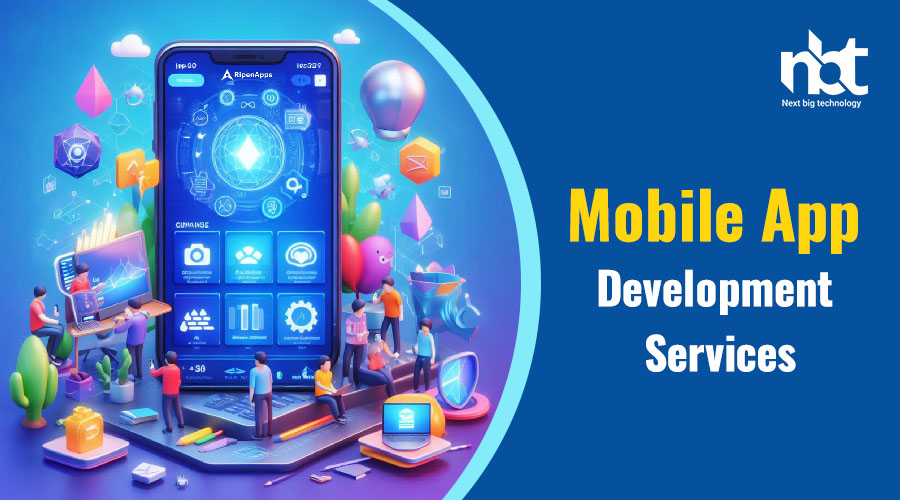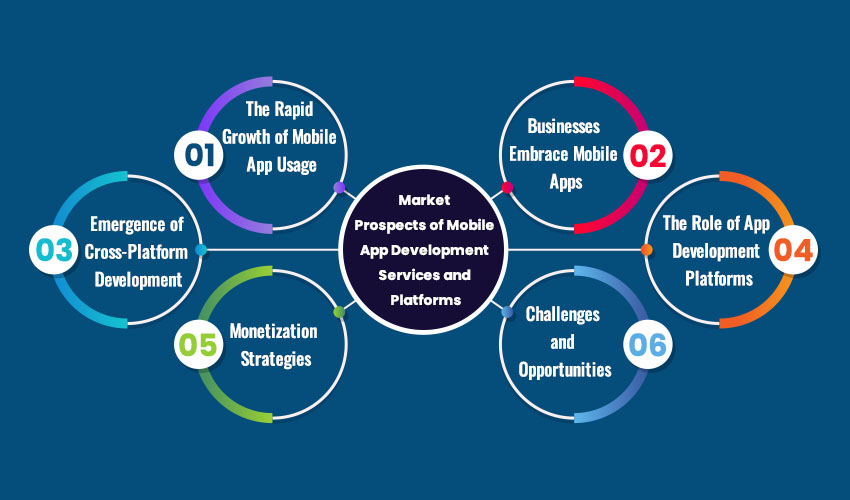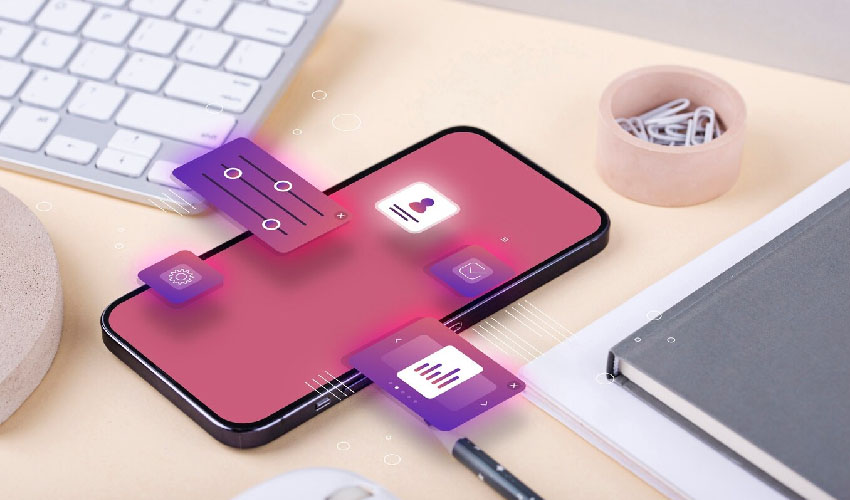Table of Contents
Mobile App Development Services
In the fast-paced realm of modern business, the significance of mobile app development services cannot be overstated. With the exponential growth of smartphone usage globally, businesses are increasingly leveraging mobile applications to engage with their customers, streamline operations, and drive revenue growth. In this digital era, having a robust mobile presence is not just a competitive advantage but a necessity for sustainable success.
Mobile app development services encompass the process of creating software applications specifically designed to run on mobile devices, such as smartphones and tablets. These services entail a comprehensive approach that involves conceptualization, design, development, testing, deployment, and ongoing maintenance of mobile applications across various platforms like iOS and Android.
One of the primary objectives of mobile app development services is to enhance user experience. A well-designed and intuitive mobile application can significantly enhance user engagement and satisfaction, thereby fostering brand loyalty. Whether it’s a utility app, e-commerce platform, or entertainment application, the focus remains on delivering seamless functionality, captivating design, and effortless navigation to users.
Moreover, mobile apps offer businesses a unique opportunity to extend their reach and accessibility. Unlike traditional websites, mobile applications provide instant access to features and content, irrespective of the user’s location or internet connectivity. This omnipresence enables businesses to stay connected with their audience round the clock, thereby fostering continuous engagement and interaction.
From a business perspective, mobile app development services offer a myriad of benefits. These include:
- Enhanced Customer Engagement: Mobile apps enable businesses to personalize interactions with customers through features like push notifications, in-app messaging, and tailored content delivery.
- Increased Brand Visibility: A well-designed mobile app acts as a powerful marketing tool, helping businesses to enhance their brand visibility and attract new customers.
- Improved Efficiency: Mobile apps can streamline various business processes, such as sales, inventory management, and customer support, leading to improved operational efficiency and cost savings.
- Data-driven Insights: Mobile apps collect valuable data on user behavior, preferences, and demographics, enabling businesses to gain actionable insights for strategic decision-making and targeted marketing campaigns.
- Competitive Edge: In today’s competitive landscape, having a feature-rich mobile app sets businesses apart from their competitors and positions them as innovative industry leaders.
How to Create a Mobile App Development Services
In today’s digital age, having a mobile app for your business is no longer a luxury but a necessity. With the increasing reliance on smartphones for daily tasks, businesses need to ensure their presence on mobile platforms. However, creating a mobile app development service from scratch can seem daunting. In this comprehensive guide, we’ll walk you through the steps to establish your mobile app development services successfully.
- Market Research and Analysis: Before diving into the development process, it’s crucial to conduct thorough market research. Identify your target audience, analyze competitors, and determine the demand for specific types of mobile apps. Understanding market trends and user preferences will guide your decision-making process throughout the development phase.
- Define Your Services: Clearly define the services you’ll offer as a mobile app development company. Will you specialize in iOS, Android, or cross-platform app development? Will you provide additional services such as UI/UX design, testing, or maintenance? Defining your services will help you position yourself in the market and attract potential clients.
- Build a Skilled Team: Assemble a team of talented individuals with expertise in mobile app development. Depending on your services, you may need developers proficient in programming languages like Swift (for iOS) or Java/Kotlin (for Android), as well as designers, testers, and project managers. Collaborate with professionals who are passionate about creating innovative mobile solutions.
- Develop a Unique Value Proposition: What sets your mobile app development services apart from competitors? Whether it’s your commitment to quality, faster turnaround times, or competitive pricing, clearly communicate your unique value proposition to potential clients. Highlight your strengths and showcase successful projects to build credibility in the industry.
- Establish a Strong Online Presence: Create a professional website showcasing your portfolio, services, and client testimonials. Utilize social media platforms, industry forums, and online directories to promote your services and engage with potential clients. Investing in search engine optimization (SEO) will help improve your visibility and attract organic traffic to your website.
- Client Acquisition and Relationship Management: Develop a robust client acquisition strategy to attract new clients. Attend industry events, network with potential clients, and leverage partnerships to expand your client base. Prioritize building long-term relationships with clients by delivering exceptional service, maintaining open communication, and exceeding expectations.
- Continuous Learning and Improvement: The field of mobile app development is constantly evolving with new technologies and trends emerging regularly. Encourage continuous learning and professional development within your team to stay updated with the latest advancements. Embrace feedback from clients and industry peers to identify areas for improvement and enhance your services continually.
- Quality Assurance and Testing: Prioritize quality assurance and testing throughout the app development lifecycle. Conduct comprehensive testing to identify and address any bugs, glitches, or performance issues before launching the app. Ensure compatibility across different devices, screen sizes, and operating systems to provide a seamless user experience.
- Launch and Marketing: Plan a strategic launch for the mobile apps you develop, utilizing app stores, press releases, and promotional campaigns to generate buzz and attract users. Implement effective app marketing strategies, such as app store optimization (ASO), social media advertising, and influencer partnerships, to maximize visibility and downloads.
- Post-Launch Support and Maintenance: Offer post-launch support and maintenance services to ensure the optimal performance and longevity of the apps you develop. Address user feedback promptly, release regular updates with new features and improvements, and provide technical assistance to clients as needed. Building a reputation for reliable support will foster client satisfaction and loyalty.
Why Should You Go for Mobile App Development Services
In today’s digital era, the significance of mobile applications cannot be overstated. With smartphones becoming an integral part of daily life, businesses are increasingly recognizing the importance of having a strong presence on mobile platforms. Whether you’re a startup or a well-established enterprise, investing in mobile app development services can offer a myriad of benefits. Let’s delve into five compelling reasons why you should consider embracing mobile app development for your business:
- Enhanced User Experience: Mobile apps provide a seamless and personalized user experience that websites often struggle to match. With features such as push notifications, in-app messaging, and personalized content, apps offer a level of engagement that is unmatched by other channels. By investing in mobile app development services, you can create a user-centric platform that caters to the unique preferences and needs of your target audience, ultimately enhancing customer satisfaction and loyalty.
- Increased Brand Visibility and Recognition: Having a well-designed and functional mobile app can significantly boost your brand’s visibility and recognition. With millions of apps available in app stores, having your own app ensures that your brand remains at the fingertips of your customers. Moreover, a professionally developed app reflects positively on your brand image, conveying a sense of credibility and reliability to your audience.
- Expanded Customer Reach: Mobile apps open up new avenues for reaching and engaging with customers. Whether through app store listings, social media promotions, or app-specific marketing campaigns, having a mobile app enables you to tap into a wider audience base. Furthermore, features such as geolocation targeting and analytics allow you to better understand your customers’ behavior and preferences, enabling you to tailor your marketing efforts for maximum impact.
- Competitive Advantage: In today’s fiercely competitive business landscape, staying ahead of the curve is essential for success. By investing in mobile app development services, you gain a competitive edge by offering a convenient and innovative way for customers to interact with your brand. A well-executed mobile strategy can differentiate your business from competitors, attract new customers, and retain existing ones, thereby driving growth and profitability.
- Monetization Opportunities: Mobile apps offer various monetization opportunities that can contribute to your bottom line. Whether through in-app purchases, subscriptions, advertising, or sponsored content, mobile apps provide multiple revenue streams for businesses. By leveraging these monetization strategies, you can generate additional income and maximize the return on your investment in mobile app development services.
Market Prospects of Mobile App Development Services and Platforms
In today’s digital age, the mobile app industry has emerged as a powerhouse, revolutionizing the way businesses interact with their customers. With the ever-increasing reliance on smartphones and tablets, the demand for innovative mobile applications continues to soar. As a result, the market prospects for mobile app development services and platforms are incredibly promising, offering lucrative opportunities for businesses and developers alike.
The Rapid Growth of Mobile App Usage: The proliferation of smartphones and the accessibility of high-speed internet have significantly contributed to the exponential growth of mobile app usage. From social networking and e-commerce to gaming and productivity, there seems to be an app for virtually every aspect of our lives. According to Statista, global mobile app revenues are projected to reach $935 billion by 2023, highlighting the immense potential of this industry.
Businesses Embrace Mobile Apps: Businesses across various sectors have recognized the importance of mobile apps in engaging with their target audience and staying ahead of the competition. Whether it’s enhancing customer experience, streamlining operations, or driving revenue growth, mobile apps offer unparalleled opportunities for businesses to thrive in today’s digital landscape.
Emergence of Cross-Platform Development: With the increasing diversity of mobile devices and operating systems, developers are turning to cross-platform development frameworks like React Native, Flutter, and Xamarin to streamline the app development process. These frameworks allow developers to write code once and deploy it across multiple platforms, thereby reducing time-to-market and development costs.
The Role of App Development Platforms: App development platforms play a crucial role in simplifying the app development lifecycle, providing developers with tools and resources to build, test, and deploy their apps efficiently. Platforms like Google Play Store and Apple App Store serve as gateways for developers to reach millions of potential users worldwide, offering unparalleled visibility and monetization opportunities.
Monetization Strategies: Monetizing mobile apps has become increasingly diverse, with developers employing various strategies such as in-app purchases, subscriptions, freemium models, and advertising. Moreover, the advent of mobile payment solutions has further facilitated monetization, allowing users to make seamless transactions within the app ecosystem.
Challenges and Opportunities: While the mobile app industry presents immense opportunities, it is not without its challenges. Developers must contend with issues such as device fragmentation, security vulnerabilities, and evolving user preferences. However, by staying abreast of technological advancements and adopting agile development practices, developers can overcome these challenges and capitalize on the vast potential of the market.
Essential Features of a Mobile App Development Services
In today’s digital era, mobile applications have become indispensable tools for businesses to engage with their customers effectively. With the ever-growing demand for mobile apps, the significance of professional mobile app development services cannot be overstated. These services play a pivotal role in transforming ideas into functional, user-friendly, and innovative mobile applications. To ensure the success of your app, it’s crucial to understand the essential features that top-notch mobile app development services offer.
- User-Centric Design: A user-friendly design is paramount for the success of any mobile application. Top mobile app development services prioritize user experience (UX) and user interface (UI) design to ensure seamless navigation, intuitive layouts, and visually appealing interfaces. By incorporating user-centric design principles, these services create apps that resonate with the target audience, leading to higher user engagement and retention.
- Cross-Platform Compatibility: With the diverse range of devices and operating systems available in the market, it’s essential for mobile apps to be compatible across various platforms. Leading app development services leverage cross-platform frameworks like React Native or Flutter to develop apps that function seamlessly on both iOS and Android devices. By embracing cross-platform development, businesses can reach a broader audience while minimizing development costs and time-to-market.
- Scalability and Flexibility: Successful mobile apps are those that can adapt and scale according to evolving business needs and user demands. Professional app development services prioritize scalability and flexibility during the development process, ensuring that the app can accommodate increased user traffic, feature enhancements, and integrations with third-party services. By building a scalable architecture, businesses can future-proof their mobile apps and maintain a competitive edge in the market.
- Robust Security Measures: Security is a top concern for both businesses and users in the digital landscape. Reputable app development services implement robust security measures to protect sensitive user data and ensure the integrity of the app. This includes implementing data encryption, secure authentication mechanisms, and regular security audits to identify and address potential vulnerabilities. By prioritizing security, businesses can build trust with their users and safeguard their reputation.
- Integration of Advanced Technologies: To stay ahead of the curve, mobile app development services integrate advanced technologies such as artificial intelligence (AI), machine learning (ML), augmented reality (AR), and blockchain into their apps. Whether it’s implementing personalized recommendations, enhancing user engagement through AR experiences, or ensuring transparent transactions with blockchain technology, leveraging these innovations can elevate the functionality and appeal of the app.
- Continuous Maintenance and Support: The journey of app development doesn’t end with the app’s launch; it requires ongoing maintenance and support to address bugs, introduce new features, and optimize performance. Leading app development services offer comprehensive maintenance and support packages to ensure the smooth operation of the app post-launch. This includes regular updates, performance monitoring, and timely technical assistance to address any issues that may arise.
Advanced Features of a Mobile App Development Services
In the ever-evolving landscape of technology, mobile applications have become indispensable tools for businesses seeking to engage their customers and streamline their operations. With the rapid advancement in mobile app development services, developers are continually integrating innovative features to enhance user experience, boost efficiency, and stay ahead in the competitive market. Let’s delve into the advanced features that are shaping the future of mobile app development services.
- Augmented Reality (AR) and Virtual Reality (VR) Integration: One of the most captivating advancements in mobile app development is the integration of AR and VR technologies. These immersive technologies enable users to experience virtual environments, try products virtually, and interact with digital elements in the real world. Businesses across various industries, from retail to education and gaming, are leveraging AR and VR to offer unique and engaging experiences to their users.
- Artificial Intelligence (AI) and Machine Learning (ML): AI and ML algorithms are revolutionizing mobile app development by enabling personalized user experiences, predictive analytics, and automation of tasks. From chatbots providing instant customer support to recommendation engines suggesting relevant content, AI-powered features enhance user engagement and efficiency. Moreover, ML algorithms analyze user data to offer tailored recommendations, driving user retention and satisfaction.
- Internet of Things (IoT) Integration: The integration of IoT technology with mobile apps enables seamless connectivity between devices, allowing users to control and monitor IoT-enabled devices remotely. Whether it’s controlling smart home appliances, tracking fitness metrics through wearables, or managing inventory in retail businesses, IoT integration enhances convenience and efficiency.
- Blockchain Integration for Security: Security is paramount in mobile app development, especially for apps dealing with sensitive user data or financial transactions. Blockchain technology offers decentralized and immutable data storage, ensuring enhanced security and transparency. By integrating blockchain, mobile apps can provide secure authentication, tamper-proof transaction records, and protection against data breaches.
- Progressive Web Apps (PWAs): PWAs combine the best of web and mobile apps, offering a native app-like experience within a web browser. These lightweight and fast-loading apps eliminate the need for installation and provide offline access, making them ideal for users with limited storage or intermittent internet connectivity. PWAs are gaining popularity due to their cross-platform compatibility and ability to reach a wider audience.
- Voice Recognition and Natural Language Processing (NLP): Voice-enabled features powered by NLP technology enable hands-free interaction with mobile apps, offering convenience and accessibility to users. Whether it’s voice commands for controlling app functionalities or voice search for finding information quickly, integrating voice recognition enhances user engagement and productivity.
- Cloud Integration for Scalability: Cloud-based mobile app development offers scalability, flexibility, and cost-effectiveness, allowing apps to handle increased user loads and data storage requirements seamlessly. Cloud integration enables real-time synchronization across devices, easy updates, and accessibility from anywhere, ensuring a smooth user experience.
Mobile App Development Services Timelines
In today’s digital age, mobile applications have become an indispensable tool for businesses to connect with their customers effectively. Whether it’s for enhancing user experience, streamlining processes, or expanding market reach, the demand for mobile app development services is on the rise. However, one crucial aspect that often perplexes both clients and developers alike is understanding the timelines involved in mobile app development projects.
Mobile app development timelines can vary significantly depending on various factors such as the complexity of the app, features required, platform compatibility, design intricacies, and testing requirements. To shed light on this crucial aspect, let’s delve into the typical phases involved in mobile app development and the timelines associated with each phase:
- Discovery and Planning Phase (1-2 weeks): This initial phase involves brainstorming sessions, market research, and defining project objectives. Clients collaborate with developers to outline app features, target audience, platform preferences (iOS, Android, or cross-platform), and establish a project timeline and budget.
- Design Phase (2-4 weeks): Designers create wireframes, prototypes, and UI/UX designs based on the project requirements gathered during the discovery phase. Iterative feedback and revisions are common during this phase to ensure the final design aligns with the client’s vision and user expectations.
- Development Phase (4-12 weeks): Developers commence coding based on the approved designs and functional requirements. The complexity of the app and the number of features heavily influence the duration of this phase. Agile methodologies like Scrum or Kanban are often employed to manage development tasks efficiently and accommodate changes effectively.
- Testing and Quality Assurance Phase (2-4 weeks): Rigorous testing is conducted across multiple devices and platforms to identify and fix bugs, glitches, and performance issues. Quality assurance specialists ensure the app meets industry standards, security protocols, and provides a seamless user experience.
- Deployment and Launch Phase (1-2 weeks): Once the app is thoroughly tested and approved, it is submitted to respective app stores (App Store for iOS, Google Play Store for Android). App deployment involves adhering to specific guidelines and procedures set by each platform. Post-launch activities include marketing strategies, user feedback collection, and continuous monitoring for any post-deployment issues.
- Post-launch Support and Maintenance (Ongoing): After the app goes live, developers provide continuous support, monitor app performance, and release updates to address user feedback, add new features, or patch security vulnerabilities. Maintenance activities ensure the app remains functional, secure, and compatible with evolving technologies and operating systems.
While the above timelines provide a general framework, it’s essential to understand that every mobile app development project is unique and may require adjustments based on specific requirements, unforeseen challenges, and client preferences. Effective communication, collaboration, and project management are vital to ensure timely delivery without compromising on quality.
How Much Does It Cost to Build a Mobile App Development Service?
In the fast-paced digital age we live in, mobile applications have become an integral part of our daily lives. From ordering food to managing finances, there seems to be an app for everything. However, behind every successful mobile app, there’s a meticulous process and investment involved in its development. So, how much does it really cost to build a mobile app?
Determining the exact cost of developing a mobile app can be tricky as it depends on various factors such as complexity, features, platform, design, and development time. However, to give you a rough estimate, let’s delve into the key components that contribute to the overall cost:
- Type of App: The type of mobile app you want to develop significantly impacts the cost. Is it a simple informational app, a gaming app, an e-commerce platform, or a social networking app? Each type comes with its own set of features and complexities, thus affecting the development cost.
- Platform: Another crucial factor is the choice of platform – iOS, Android, or both (cross-platform). Developing for iOS tends to be slightly more expensive due to the need for specialized skills and strict app store guidelines, whereas Android offers more flexibility but requires thorough testing across a variety of devices.
- Design: A visually appealing and user-friendly design is imperative for the success of any mobile app. Investing in a professional UI/UX design can enhance user experience but may also add to the overall cost.
- Features and Functionality: The more features and functionalities you want to incorporate into your app, the higher the development cost. Features like user authentication, push notifications, in-app purchases, geolocation services, and integration with third-party APIs all contribute to the complexity and cost.
- Backend Development: Building a robust backend infrastructure to support the app’s functionality, manage data, and ensure security is essential. The complexity of the backend architecture will impact the development cost.
- Testing and Deployment: Thorough testing is crucial to identify and fix any bugs or issues before launching the app. Additionally, deploying the app to the respective app stores also incurs costs.
- Maintenance and Updates: The cost of mobile app development doesn’t end with the initial launch. You’ll need to budget for ongoing maintenance, updates, and support to keep your app relevant and bug-free.
Now, let’s talk numbers. On average, the cost of developing a basic mobile app can range from $10,000 to $50,000. However, for more complex apps with advanced features and functionalities, the cost can soar anywhere from $50,000 to $500,000 or even more for enterprise-level solutions.
It’s important to note that these figures are just estimates, and the actual cost can vary based on individual project requirements, the geographic location of the development team, and other factors.
How to Create a Mobile App Development Services – Team and Tech Stack
In the fast-paced digital era, mobile apps have become the cornerstone of modern business strategies. Whether it’s enhancing customer engagement, streamlining processes, or expanding market reach, a well-crafted mobile app can work wonders for any organization. However, the journey from ideation to deployment involves meticulous planning, skilled professionals, and the right technological infrastructure. Here’s a comprehensive guide on how to create a proficient mobile app development team and select the appropriate tech stack for your project.
- Understanding the Role of Each Team Member:
- Project Manager: Acts as the bridge between clients and the development team, ensuring seamless communication, project timelines, and resource allocation.
- UI/UX Designer: Responsible for creating visually appealing and user-friendly interfaces that enhance the overall user experience.
- Developers: Front-end developers focus on client-side programming, while back-end developers handle server-side logic and database management.
- Quality Assurance (QA) Engineer: Conducts rigorous testing to identify and rectify bugs, ensuring the app’s functionality, usability, and performance.
- DevOps Engineer: Manages the deployment, automation, and monitoring of the app’s infrastructure, ensuring smooth operations throughout its lifecycle.
- Building a Diverse and Skilled Team:
- Technical Proficiency: Look for professionals proficient in programming languages such as Java, Kotlin (for Android), Swift (for iOS), and frameworks like React Native or Flutter for cross-platform development.
- Creativity and Innovation: Seek individuals with a creative mindset who can brainstorm innovative solutions and design captivating user interfaces.
- Collaborative Spirit: Emphasize teamwork and effective communication skills to foster collaboration and synergy within the team.
- Adaptability: In the dynamic landscape of mobile app development, adaptability to emerging technologies and methodologies like Agile or Scrum is crucial.
- Selecting the Right Tech Stack:
- Programming Languages: Choose languages based on the platform – Java or Kotlin for Android, Swift for iOS, and JavaScript for cross-platform development.
- Frameworks: Consider frameworks like React Native or Flutter for cross-platform development, offering code reusability and faster time-to-market.
- Backend Technologies: Opt for robust backend technologies such as Node.js, Python (Django), or Java (Spring Boot) for scalable and secure server-side development.
- Database Management: Utilize databases like MySQL, PostgreSQL, or MongoDB based on the app’s requirements for efficient data storage and retrieval.
- Cloud Services: Leverage cloud platforms like AWS, Google Cloud, or Microsoft Azure for hosting, storage, and scalable infrastructure.
- Continuous Learning and Improvement:
- Encourage continuous learning and skill development through workshops, online courses, and hands-on training sessions.
- Stay updated with the latest trends, tools, and best practices in mobile app development to deliver cutting-edge solutions.
- Foster a culture of innovation, feedback, and iteration to continually refine the development process and deliver superior user experiences.
Mobile App Development Services Process
In today’s fast-paced digital era, mobile applications have become indispensable tools for businesses to engage with their customers effectively. With the ever-growing demand for mobile apps, the process of developing them has evolved significantly to meet diverse needs and preferences. Understanding the intricacies of mobile app development services process is crucial for businesses aiming to create successful and user-friendly applications. Let’s delve into the seamless process of mobile app development services.
- Conceptualization and Planning: The journey of mobile app development begins with a solid concept. This phase involves brainstorming ideas, conducting market research, and defining the app’s objectives and target audience. Developers work closely with clients to understand their requirements and goals to create a comprehensive project plan.
- UI/UX Design: A captivating user interface (UI) and seamless user experience (UX) are paramount for the success of any mobile application. During this phase, designers focus on creating visually appealing designs while ensuring intuitive navigation and functionality. Prototypes and wireframes are often developed to visualize the app’s layout and features before proceeding to the development stage.
- Development: This is the core phase where the actual coding and programming take place. Developers leverage various technologies and programming languages such as Java, Swift, or React Native to build the app’s architecture and functionalities. Agile methodologies are commonly employed to ensure flexibility and efficiency throughout the development process. Continuous testing and feedback loops are integral to identify and address any issues promptly.
- Testing and Quality Assurance: Rigorous testing is essential to ensure the app’s performance, functionality, and security. Quality assurance (QA) professionals conduct various tests including functional testing, usability testing, compatibility testing, and security testing to identify and rectify any bugs or glitches. This iterative process continues until the app meets the desired standards of quality and reliability.
- Deployment: Once the app is thoroughly tested and approved, it is ready for deployment to the respective app stores such as the Apple App Store or Google Play Store. Developers follow the guidelines and requirements of each platform to ensure smooth submission and approval. Deployment also involves optimizing the app’s metadata and assets for better visibility and discoverability.
- Post-launch Support and Maintenance: The journey doesn’t end with the app’s launch. Continuous support and maintenance are crucial to address user feedback, implement updates, and fix any issues that may arise post-launch. Developers monitor the app’s performance, analyze user metrics, and incorporate new features or enhancements to keep the app competitive and relevant in the ever-evolving market.
- Iterative Improvements: Mobile app development is an iterative process that involves constant evolution and improvement. Based on user feedback, market trends, and technological advancements, developers continue to refine and enhance the app to deliver an exceptional user experience and drive business growth.
Next Big Technology – Your Trusted Mobile App Development Services Partner
In today’s rapidly evolving digital landscape, staying ahead of the curve is essential for businesses aiming to thrive. With mobile technology being at the forefront of this transformation, having a reliable partner for mobile app development is crucial. Welcome to the future with our trusted mobile app development services, where innovation meets excellence, and your vision is brought to life.
Understanding Your Needs: We recognize that every business is unique, and so are its requirements. Our first step is always to understand your objectives, target audience, and the problem you aim to solve. By delving deep into your business model, we ensure that the solutions we provide are not just technically sound but also align perfectly with your strategic goals.
Unleashing Innovation: Innovation drives progress, and we are committed to harnessing the latest technologies to craft cutting-edge mobile applications. From augmented reality to artificial intelligence, our team of skilled developers is proficient in utilizing a diverse range of tools and frameworks to build interactive and engaging apps that captivate users.
Seamless User Experience: User experience is paramount in the success of any mobile application. Our focus on intuitive design and smooth functionality ensures that your app not only looks great but also offers a seamless user experience. By incorporating user feedback and iterative testing, we refine the app until it achieves perfection.
Reliability and Support: Our commitment to excellence doesn’t end with the deployment of your mobile app. We provide ongoing support and maintenance to ensure that your app remains up-to-date and fully functional. Whether it’s fixing bugs, implementing new features, or optimizing performance, our team is always here to support you every step of the way.
Transparent Communication: We believe in fostering open and transparent communication with our clients. From project inception to completion, you’ll have full visibility into the development process, allowing you to provide feedback and make informed decisions along the way. Our goal is to build lasting partnerships based on trust and collaboration.
Future-Proof Solutions: In a rapidly evolving technological landscape, it’s essential to future-proof your mobile applications. Our forward-thinking approach ensures that the solutions we deliver are scalable, adaptable, and built to withstand the test of time. Whether it’s embracing emerging trends or integrating new functionalities, we ensure that your app remains relevant in the ever-changing market.
Enterprise Mobile App Development Services
In today’s fast-paced digital landscape, having a robust mobile presence is no longer just an option for enterprises; it’s a necessity. With the increasing reliance on smartphones and tablets, businesses need to adapt and optimize their operations for mobile platforms to stay competitive. This is where enterprise mobile app development services come into play, offering tailored solutions to meet the unique needs of businesses across various industries.
Understanding Enterprise Mobile App Development Services: Enterprise mobile app development services encompass the entire process of creating, deploying, and managing mobile applications specifically designed to address the complex requirements of large organizations. These services go beyond simple consumer-facing apps and delve into developing solutions that streamline internal processes, enhance communication, boost productivity, and drive innovation within the enterprise ecosystem.
Key Features and Benefits
- Customization: Enterprise mobile app development services focus on understanding the intricacies of each business and crafting bespoke solutions tailored to their specific needs. Whether it’s integrating with existing systems, implementing security protocols, or designing intuitive user interfaces, customization is at the core of these services.
- Scalability: As enterprises grow and evolve, so do their technological requirements. Mobile apps developed by specialized services are built with scalability in mind, ensuring they can seamlessly adapt to increasing demands without compromising performance or user experience.
- Security: Security is paramount in enterprise environments where sensitive data and proprietary information are at stake. Enterprise mobile app development services prioritize implementing robust security measures, including data encryption, authentication protocols, and secure backend integration, to safeguard against potential cyber threats.
- Integration: Integration with existing enterprise systems, such as Customer Relationship Management (CRM) software, Enterprise Resource Planning (ERP) solutions, and backend databases, is critical for maximizing efficiency and ensuring seamless workflow automation. These services excel in integrating mobile apps with various enterprise systems, fostering cohesive operations across departments.
- Cross-Platform Compatibility: With the diversity of mobile devices and operating systems in the market, ensuring cross-platform compatibility is essential. Enterprise mobile app development services employ frameworks and technologies that enable the creation of apps compatible with iOS, Android, and other platforms, ensuring broader reach and accessibility.
- Analytics and Insights: Data-driven decision-making is fundamental to driving business growth. Enterprise mobile apps developed by specialized services often come equipped with analytics and reporting functionalities, allowing enterprises to gain valuable insights into user behavior, app performance, and overall business metrics.
Choosing the Right Partner: Selecting the right partner for enterprise mobile app development services is crucial for achieving success in your digital transformation journey. When evaluating potential service providers, consider factors such as their expertise in enterprise solutions, past experience, technological capabilities, adherence to industry best practices, and commitment to ongoing support and maintenance.
Top Mobile App Development Services Company
In this digital era where smartphones have become an integral part of our lives, the demand for innovative mobile applications is skyrocketing. Whether it’s for entertainment, communication, productivity, or business, mobile apps are driving the way we interact with technology. Behind every successful app lies a proficient mobile app development services company, adept at turning ideas into reality while ensuring seamless user experiences.
Why Choose a Top Mobile App Development Services Company?
-
-
Next Big Technology:

Hourly Rate :< $25 per Hour
Employees: 50 – 249
Focus Area
- Mobile App Development
- App Designing (UI/UX)
- Software Development
- Web Development
- AR & VR Development
- Big Data & BI
- Cloud Computing Services
- DevOps
- E-commerce Development
Industries Focus
- Art, Entertainment & Music
- Business Services
- Consumer Products
- Designing
- Education
- Financial & Payments
- Gaming
- Government
- Healthcare & Medical
- Hospitality
- Information Technology
- Legal & Compliance
- Manufacturing
- Media
-
- Innovative Solutions: These companies stay updated with the latest trends and technologies in the mobile app development landscape. From AI and AR/VR to IoT integrations, they offer cutting-edge solutions tailored to meet clients’ specific needs.
- User-Centric Approach: User experience (UX) is paramount in app development. Top companies prioritize UX design to ensure intuitive navigation, engaging interfaces, and high performance, ultimately enhancing user satisfaction and retention.
- Agile Development Methodology: Agile methodologies like Scrum and Kanban enable iterative development, ensuring flexibility, adaptability, and faster time-to-market. Top companies embrace agile practices to deliver high-quality apps within stipulated timelines.
- Quality Assurance: Rigorous testing is imperative to identify and rectify bugs, glitches, and performance issues. Top companies employ robust quality assurance processes, including automated testing, manual testing, and user acceptance testing, to deliver flawless, bug-free apps.
Characteristics of a Top Mobile App Development Services Company
- Portfolio and Clientele: Evaluate the company’s portfolio to gauge its expertise, creativity, and versatility. Client testimonials and case studies provide insights into their track record and client satisfaction levels.
- Communication and Collaboration: Effective communication and collaboration are vital for project success. Top companies maintain transparent communication channels, keeping clients informed about project progress, challenges, and milestones.
- Scalability and Support: Choose a company capable of scaling its resources and infrastructure to accommodate evolving project requirements. Additionally, post-launch support and maintenance services ensure continuous app optimization and seamless performance.
- Cost-Effectiveness: While cost is a significant factor, it shouldn’t be the sole determinant. Look for companies offering competitive pricing without compromising on quality, reliability, or support.
Add Comparison Table Mobile App Development Services
In the rapidly evolving digital landscape, mobile app development has become a crucial aspect for businesses aiming to establish a strong online presence. Choosing the right mobile app development service is paramount for success. In this article, we’ll explore and compare some of the top mobile app development services to help you make an informed decision for your next project.
Top Mobile App Development Services:
- Appinventiv:
- Expertise: Appinventiv is known for its expertise in developing high-performance and scalable mobile applications across various industries.
- Technology Stack: They leverage cutting-edge technologies like AI, IoT, and blockchain to deliver innovative solutions.
- Clientele: Appinventiv has an impressive client base, including Fortune 500 companies, showcasing their reliability and trustworthiness.
- WillowTree:
- User-Centric Approach: WillowTree focuses on creating user-centric designs, ensuring a seamless and engaging experience for end-users.
- Award-Winning Apps: The company has received numerous awards for its outstanding app designs and development services.
- Cross-Platform Development: WillowTree excels in cross-platform development, providing cost-effective solutions without compromising on quality.
- Intellectsoft:
- Global Presence: With offices in multiple countries, Intellectsoft offers a global perspective on app development, catering to diverse markets.
- Enterprise Solutions: They specialize in developing robust enterprise solutions, making them an ideal choice for businesses with complex requirements.
- Post-Launch Support: Intellectsoft is recognized for its excellent post-launch support, ensuring that clients receive ongoing assistance and updates.
- Fueled:
- Innovative Design: Fueled is renowned for its innovative and aesthetically pleasing app designs that captivate users from the first interaction.
- Startup Focus: The company has a strong focus on startups, helping them bring their unique ideas to life with tailor-made mobile applications.
- Transparent Communication: Fueled emphasizes transparent communication throughout the development process, keeping clients informed and involved.
Comparison Table:
| Feature | Appinventiv | WillowTree | Intellectsoft | Fueled |
|---|---|---|---|---|
| Expertise | High-performance and scalable apps | User-centric designs | Global perspective | Innovative app designs |
| Technology Stack | AI, IoT, blockchain | Cross-platform development | Robust enterprise solutions | Innovative design |
| Clientele | Fortune 500 companies | Awards for outstanding apps | Global presence | Startup focus |
| Global Presence | Limited | Multiple countries | Multiple countries | Limited |
| Post-Launch Support | Strong support system | Ongoing assistance | Excellent support | Transparent communication |
FAQs on Mobile App Development Services
In today’s digital age, mobile applications have become a crucial component for businesses aiming to expand their reach and enhance customer engagement. However, navigating the realm of mobile app development services can be overwhelming, especially for those new to the field. To shed light on this topic, we’ve compiled a list of frequently asked questions (FAQs) to provide clarity and guidance.
1. What are mobile app development services? Mobile app development services encompass the entire process of creating a mobile application, from conceptualization to deployment and maintenance. These services typically include ideation, design, development, testing, and ongoing support to ensure the app’s functionality and performance meet the client’s requirements.
2. What platforms can mobile app development services target? Mobile app development services can target various platforms, including iOS, Android, and cross-platform solutions. Developers utilize different technologies and programming languages such as Swift or Objective-C for iOS and Java or Kotlin for Android. Cross-platform frameworks like React Native or Flutter allow developers to write code once and deploy it across multiple platforms.
3. How long does it take to develop a mobile app? The timeline for developing a mobile app varies depending on factors such as complexity, features, platform(s), and the development approach. Simple apps with basic functionalities may take a few weeks to develop, while more complex apps can take several months or even longer. It’s essential to discuss timelines with your development team to set realistic expectations.
4. What is the cost of mobile app development services? The cost of mobile app development services varies widely based on factors such as the app’s complexity, features, platform(s), development approach, and the location of the development team. Generally, mobile app development can range from a few thousand dollars for simple apps to hundreds of thousands of dollars for complex, feature-rich applications. It’s crucial to obtain detailed quotes from multiple development firms and consider the long-term value the app will provide to your business.
5. How do I choose the right mobile app development service provider? Choosing the right mobile app development service provider is critical for the success of your project. Consider factors such as the company’s experience, portfolio, expertise in relevant technologies, communication skills, and client testimonials. It’s also essential to discuss your project requirements in detail and ensure that the development team understands your vision and goals.
6. What is the post-launch support provided by mobile app development services? Post-launch support is crucial for maintaining the performance and functionality of your mobile app. Mobile app development services typically offer ongoing support and maintenance services, including bug fixes, updates, performance optimization, and feature enhancements. Ensure that your development team provides adequate post-launch support to address any issues that may arise after the app is deployed.
7. How can mobile app development services help with app monetization? Mobile app development services can assist with app monetization strategies such as in-app purchases, subscriptions, advertising, and paid downloads. By understanding your target audience and business goals, developers can integrate monetization features seamlessly into your app to generate revenue while providing value to users.
Thanks for reading our post “Mobile App Development Services”. Please connect with us to learn more about the Mobile App.
















